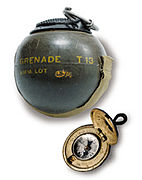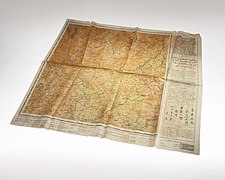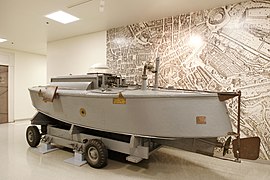CIA Museum
hideThis article has multiple issues. Please help or discuss these issues on the talk page. (Learn how and when to remove these template messages)
|
 | |
 Location within Virginia | |
| Established | June 2002 |
|---|---|
| Location | Langley, Virginia |
| Coordinates | 38°57′06″N 77°08′47″W / 38.9518°N 77.1465°WCoordinates: 38°57′06″N 77°08′47″W / 38.9518°N 77.1465°W |
| Website | www |
The CIA Museum, administered by the Center for the Study of Intelligence, is a national archive for the collection, preservation, documentation and exhibition of intelligence artifacts, culture, and history. The collection, which currently[when?] numbers 3,500 items, consists of artifacts that have been officially declassified, however since the museum is on the compound of the George Bush Center for Intelligence it is not accessible to the public. Since the museum cannot be visited by the public, the CIA Museum has partnerships with Presidential Libraries and other major museums and institutions to develop public exhibitions dedicated to understanding the craft of intelligence and its role in the broader American experience.[1] The CIA Museum has counterparts at other agencies in the United States Intelligence Community. The National Cryptologic Museum, which is open to the public in Annapolis Junction, Maryland, is the NSA counterpart to the CIA Museum and focuses on cryptology as opposed to human intelligence. On the other hand, the DIA Museum is not public and is housed at its headquarters and focuses on the history of military intelligence and DIA's role. The FBI Museum housed at its headquarters is also off limits to the public and is focused on its history as a federal law enforcement, counterintelligence, and counter-terrorism organization.
Collection[]
The CIA Museum's scope of collection includes material associated with all activities of the CIA's predecessor, the Office of Strategic Services (OSS), material associated with activities of foreign intelligence organizations, and material associated with the history and mission of the Central Intelligence Agency.[citation needed] Articles in the Museum Collection include clothing, equipment, weapons, and memorabilia and insignia designed, manufactured, or used by intelligence organizations historically and presently.[2] The Collection also includes unique items such as weapons, clothing and equipment developed specifically through research and development, or manufactured by units or individuals to further the mission of intelligence operations. The museum also displays Osama bin Laden's AK-47 along with a brick from the compound he was found in.[citation needed]
Exhibits[]
The CIA Museum currently[when?] maintains three exhibits of important historical intelligence artifacts at CIA Headquarters in Langley, Virginia. Dedicated in June 2002 to commemorate the 60th Anniversary of the Office of Strategic Services, the CIA Museum's North Gallery houses an exhibit devoted to preserving the legacy CIA inherited from the OSS.[citation needed] The exhibit displays personal memorabilia from Major General William J. Donovan, the founder of the Office of Strategic Services, examples of OSS equipment; and a German "Enigma" enciphering machine from World War II. The Cold War Gallery was established in collaboration with collector and historian H. Keith Melton in 1997. "The Cold War: Fifty Years of Silent Conflict" showcases many of the 7,000 clandestine espionage artifacts from the United States, the former Soviet Union, and East Germany, which form the world's largest private collection of spy gear.[citation needed] "Analysis Informing American Policy", located in the Fine Arts Exhibit Hall, celebrates the 50th anniversary of the creation of the Directorate of Intelligence (1952).
- Exhibits

Cold War Gallery.

The OSS A Beano grenade; a compass hidden in a uniform button.

Silk Escape and evasion map, Office of Strategic Services.

CIA designed and manufactured this two-man semi-submersible in the 1950s.

Robot Fish Charlie, Unmanned Underwater Vehicle (UUV) fish.

Pigeon Camera, designed in the 1970s.

Developed in the 1970s, this micro Unmanned Aerial Vehicle (UAV) was the first flight of an insect-sized Micro air vehicle (Insectothopter).[citation needed]

German Enigma Machine

Afghan Gallery

Al-Qa’ida Training Manual picked up near Kandahar, Afghanistan in 2001.

Afghan Saddle.
References[]
- ^ "CIA Museum — Central Intelligence Agency". www.cia.gov. Retrieved 2019-07-24.
- ^ "CIA Museum — Central Intelligence Agency". www.cia.gov. Retrieved 2019-07-24.
- Museums in Fairfax County, Virginia
- Installations of the Central Intelligence Agency
- Espionage museums
- Military and war museums in Virginia
- Non-public museums in the United States
- Law enforcement museums in the United States












